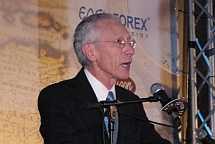Prof. Stanley Fischer, governor of the Bank of Israel, presented last week the central bank's annual report for 2005
Prof. Fischer presented the report to the acting Prime Minister Ehud Olmert, the Knesset Finance Committee and President of the State of Israel Moshe Katsav.
The central bank noted in the report that in 2005, Israel's economic recovery continued, and became even more firmly based. GDP grew by 5.2%, led again by the business sector, which grew by 6.6%.
Improvements in the macroeconomic environment and in the state of the economy were reflected in many ways. These included the decline in unemployment from 9.8 percent at the end of 2004 to 8.8% at the end of 2005, accompanied by increases in the rates of both employment and labor force participation; the increase in the surplus in the current account of the balance of payments; and positive developments in the capital markets.
The Report also states that Israel's economic growth was bolstered by the continuation of strong global growth and the sustained improvement in the security situation, as well as the steady implementation of a supportive economic strategy. The macroeconomic policy mix combined fiscal discipline, reflected in tight control of expenditure, a considerable reduction in the deficit, and tax cuts, together with an accommodative monetary policy. These made it possible to take advantage of the favorable underlying conditions, and were a key factor in the positive reactions of the financial markets.
The integration of the Israeli economy into the global economy continued apace in 2005: Imports currently constitute more than 40 percent of GDP, and exports more than 35%; Israelis' investments abroad, direct and portfolio, reached $10.1 billion; nonresidents' investments in Israel totaled $10.8 billion; and nonresidents' participation in the NIS/forex market rose to 49%. Integration into the global economy is vital for Israel's continued economic growth.
Macroeconomic policy in 2005 achieved its three numerical objectives: The rate of inflation, at 2.4%, was within the price-stability range; and both the budget deficit at 1.9% of GDP and the increase in public expenditure at about 0.3% were below their ceilings. Correspondingly the public-debt/GDP ratio declined significantly, although it remains very high in international terms. In the capital markets, where important reforms have been under way for some years, progress was made on two fronts: A significant start was made on the implementation of the recommendations of the Bachar Committee to reduce banks' holdings in provident and mutual funds, aimed at increasing competition in the capital markets and reducing conflicts of interest; and the process of equating tax rates on income earned on securities in Israel and abroad was completed, thus ending the tax discrimination that had favored Israelis' investment in securities in Israel over such investment abroad.
Bank of Israel 2005 report: Economic recovery is more firmly based
Prof. Fischer presented the report to the acting Prime Minister Ehud Olmert, the Knesset Finance Committee and President of the State of Israel Moshe Katsav
10.04.06 / 00:00
•
More articles that may interest you

Brosh: shippers will boycott Ashdod Port unless workers end the disruptions

IEICI: in February Egypt was Israel’s fastest growing market.

Israel Aircraft Industries will convert 4 Qantas' 737 passenger aircraft to freighters

El Al announced 3% fares increase

Bank of Israel: Government aware of the urgent need to deal with traffic jams

El Al airline ended 2005 with a net profit of $64.1 million
More news from Industry & Trade Section
>FICC: 12% increase in exports of services/03.04.06
>CBS: net agricultural product grew in 2005 to NIS 6.9 billion/03.04.06
>Assia: Israel’s cosmetics exports growing/27.03.06
>Daylight Savings Time to begin in Israel on 31 March/27.03.06
>Lynn: employment in the service sector increases/27.03.06
>CBS : Exports to US up and to EU down in January-February/27.03.06
>New York's Common Retirement Fund to invest $100m in Israel/20.03.06
>Apple exports to Syria to begin this week/20.03.06
>Exports of food in 2005 up 10%/20.03.06
>5.2% GDP growth in 2005/20.03.06
